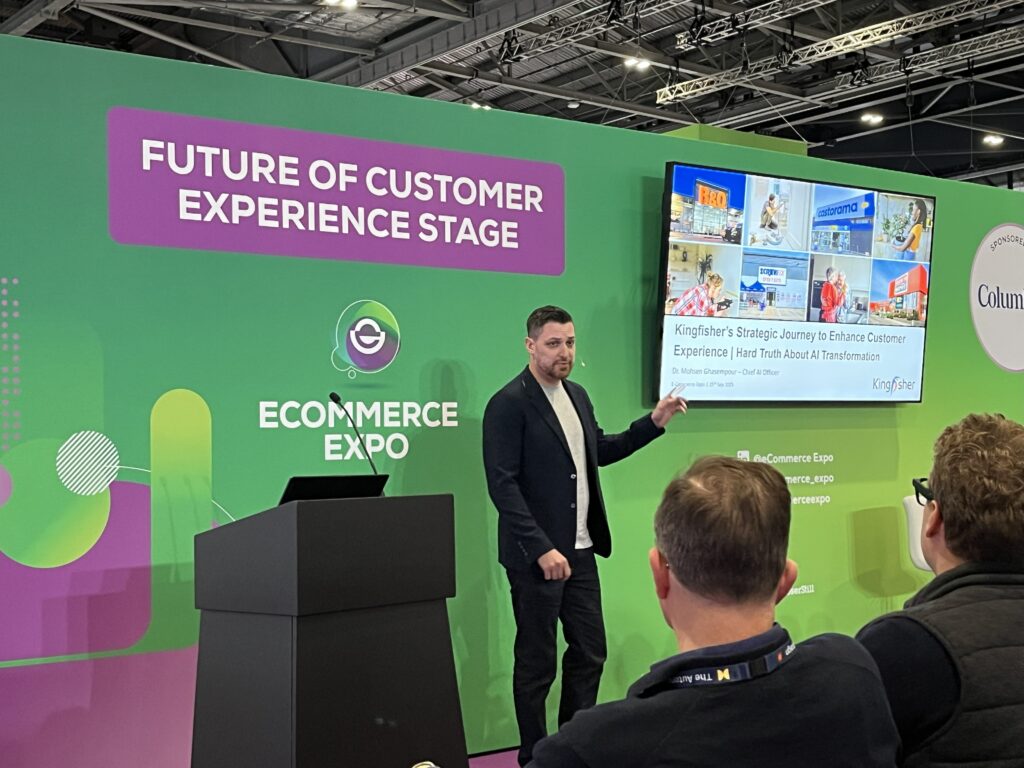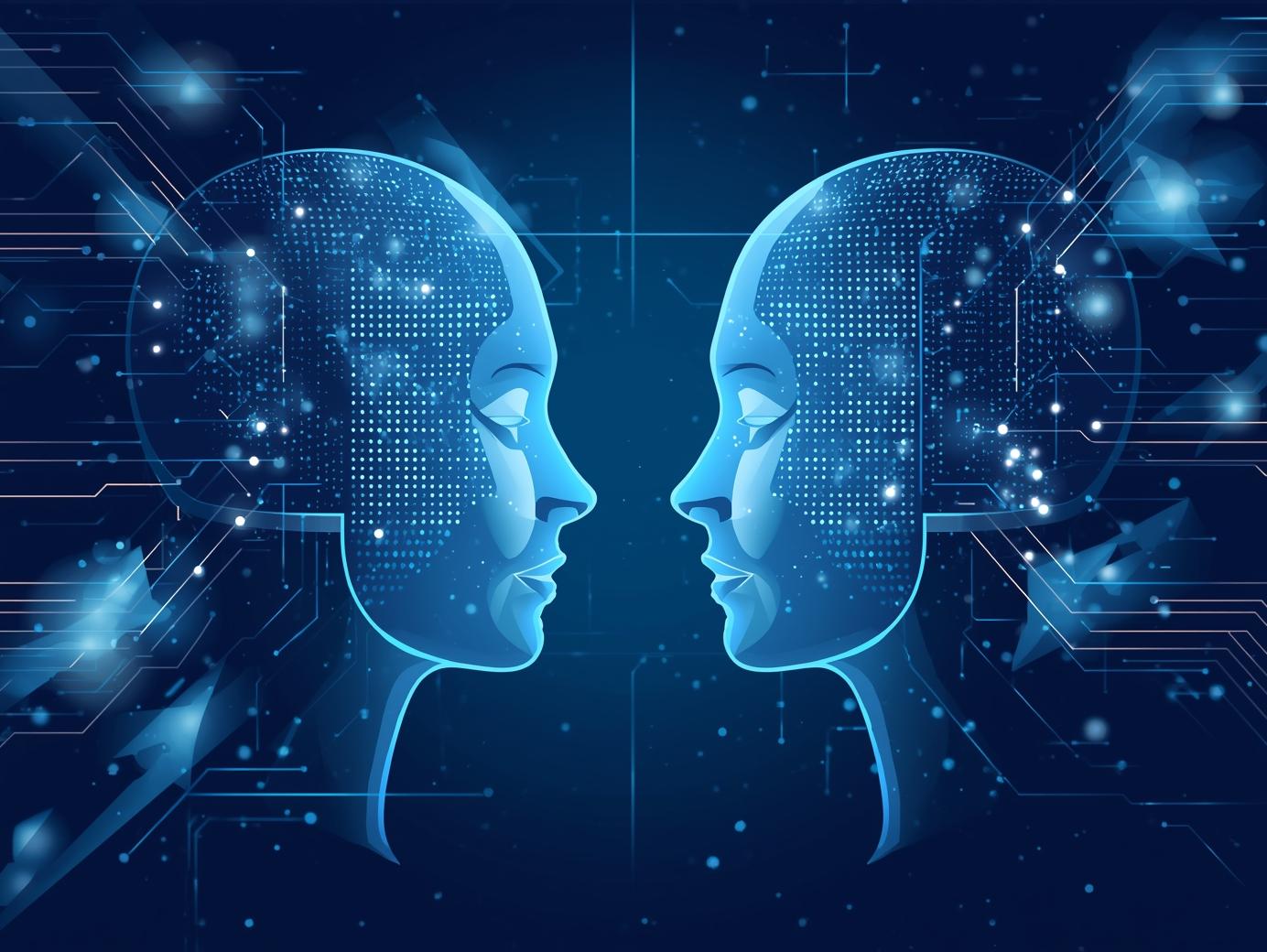Intelligence is the new commerce currency. Across two packed days, the eCommerce Expo & Technology for Marketing 2025 revealed a striking truth: digital commerce has moved far beyond simple online transactions. It is now becoming intelligent, conversational, and deeply human-centred.
What emerged was a shared vision of a future where commerce is fluid, spanning devices, channels and even autonomous agents that act on behalf of both consumers and companies. The Expo didn’t just showcase technology; it showcased a new mindset. Here are the key strategic takeaways from our DX (Digital Transformation) and CX (Customer Experience) consultants who attended both events.
When AI Becomes the Customer
Artificial intelligence was the star of the show, not just as a tool but as a participant. Conversations about agentic AI, autonomous digital agents that can negotiate, source and purchase dominated the agenda. Companies like Nibble are already deploying agents capable of haggling prices in real time on retail websites. By 2027, many believe that consumers will have their own personal AI agents, allowing them to choose when to engage with human representatives and when to let software handle the interaction.
This evolution is transforming not just commerce, but marketing itself. Large Language Models (LLMs) are rewriting the rules of visibility. New concepts like Generative Engine Optimisation (GEO), Answer Engine Optimisation (AEO), and LLM SEO highlight a world where algorithms are not.
People are the first audience to understand your brand. “AI is the new customer,” one keynote declared. Brands must now ensure their data, tone, and values are machine-readable as well as human friendly.
Even search is being reinvented. Instead of typing keywords, users can simply ask: “I need a red dress for a wedding.” The AI responds conversationally, curating options that match tone, style, and occasion. This “conversational commerce” is blurring the line between shopping and chatting bringing back a sense of dialogue that traditional eCommerce had long lost.

Elsewhere, the marketing ecosystem is becoming increasingly connected. Retail media once confined to retailer websites, is expanding into “connected media,” a network of touchpoints across social, search, and streaming platforms. Ads will soon follow intent rather than clicks, powered by AI-linked data streams. Google remains dominant for now, but with Apple preparing its own AI-driven “Answer Engine” for Siri in 2026, competition is heating up.
Even store design is evolving through vibe coding using natural-language prompts to restyle storefronts instantly (“make my homepage feel minimalist”). Paired with machine-learning-based fraud detection, which quietly guards against fake reviews and suspicious transactions, the picture is clear: AI is no longer a back-office tool; it’s the invisible hand shaping every moment of the customer journey.
The Rise of Intelligent Experience
If one theme dominated the event, it was the humanisation of digital experiences. Speakers repeatedly emphasised that technology should enable empathy, not replace it. For example, Microsoft presented its efforts to make shopping more intuitive, using AI as a “companion” that understands a customer’s journey rather than just their purchase history. Consumers, it seems, are no longer browsing products; they’re navigating journeys defined by intent, mood, and context.
Brands such as The Ordinary and Estée Lauder demonstrated that differentiation doesn’t end at checkout. In fact, post-purchase engagement has become the new battleground for loyalty. “Differentiation starts where most brands stop,” one Estée Lauder speaker noted, describing how small touches like bounce cards, loyalty tiers, and “sorry codes” can transform one-time buyers into lifelong customers.
Meanwhile, customer service is being reimagined as a collaboration between humans and machines. Repetitive tasks are increasingly handled by chatbots, freeing people to focus on empathy-driven, complex interactions. The result is a “hybrid” service model, part algorithm, part emotional intelligence that promises faster resolution without losing the personal touch.
Behind the scenes, this transformation depends on solid digital plumbing. The shift toward composable, API-driven architecture was visible across the exhibition floor.
Vendors promoted modular solutions that can evolve quickly as consumer expectations shift, ensuring that brands stay agile, connected, and ready for whatever comes next.

Implications for Businesses
The takeaways from this year’s Expo are as strategic as they are operational.
- It’s time to build agent-readiness across platforms, ensuring structured data, APIs, and clean product information management systems are in place to allow AI agents to interact seamlessly.
- Businesses should begin exploring agentic commerce pilots, both internally and for customers. These could range from personalised AI companions that assist customers in real time, to B2B procurement agents that autonomously source and negotiate on behalf of business units.
- AI-driven personalisation offers a major opportunity. The most successful brands are moving beyond behavioural recommendations (“people who bought this also bought that”) to intent-based experiences where AI interprets lifestyle cues and emotional states to guide suggestions.
- These shifts demand not just technology upgrades but cultural and capability transformation. Teams will need to build confidence in AI-enhanced systems and understand how to design, manage and audit them responsibly.
- Finally, marketing strategies must evolve for a world dominated by AI-powered discovery. Visibility in tomorrow’s search landscape will depend on how well our data speaks to machines and how authentically our stories speak to humans.
The message from eCommerce Expo was clear:
Commerce is becoming conversational, intelligent, and agentic. The winners will be those who blend empathy with automation and imagination with data.
As we look ahead, the challenge for businesses isn’t just to keep up with these changes, but to lead them, shaping a future of digital commerce that is not only smarter, but more meaningful.
Authors:
Dave Crossley, Senior DX Consultant
Asena Atilla Saunders, CX & Digital Marketing Consultant




